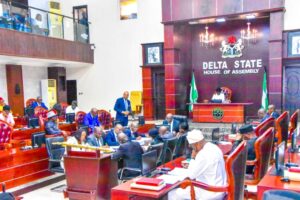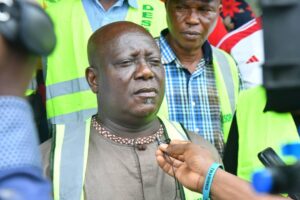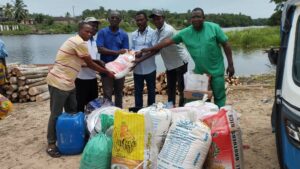RIVERS GOVT URGED TO REVIEW EMPLOYMENT POLICY, INCLUDE YOUTHS, VENERABLE GEOUPS IN YOUTH EMPLOYMENT, EMPOWERMENT PROGRAMMES
By Our Correspondent
Agencies and parastatals charged with youth employment and empowerment programmes in Rivers State have been called upon to ensure that persons with disabilities and other vulnerable groups are not marginalized in government’s activities aimed at creating employment and empowerment for youths in the state. The call was made in Port Harcourt recently when an NGO known as Centre for Environment Human Rights and Development, CEHRD led three Youth Networks – Okana Youth Leadership Network, Marine Base Youth Leadership Network and Kpor Youth Leadership Network, to the Rivers state ministry of empowerment and employment generation on advocacy visit.
Michael Chidozie and Queen Agba, CEHRD’s staff who facilitated the advocacy visit on behalf of CEHRD and the youth networks explained to this publication that the advocacy was part of a youth empowerment project being implemented in Kpor, Gokana LGA, Marine Base, Phalga LGA and Okana, Abua/Odual LGA by the organization with support from Nigerian Stability and Reconciliation Program, NSRP which is aimed at reducing violence in the society through promoting transparency, accountability and inclusivity in youth employment and empowerment programmes in Rivers state.
During the visit, representatives of the three youth networks urged the ministry represented by the director of employment to strengthen the existing employment and empowerment processes to make them more transparent, accountable and Inclusive.
The director was told that the system of using either Rivers State National Youth Council or The Local Government Chairmen to select beneficiaries for empowerment may continue to encourage corruption and back-hand practices and sabotage the essence of the programmes as the true beneficiaries may not be selected or partake in the gains of the process because it may be unduly influenced to satisfy a few persons and their interests. The ministry was told to consider different channels of advertisement and reporting of their programmes, including mass media, to ensure that the information reach the intended beneficiaries.
The groups made case for special preferences to be given to the physically challenged, those living in Riverine areas of the state and other vulnerable members of the society as they may not be in position to compete favourably with others.
In response, the director said the ministry has a graduate data base which they use in helping them connect youths to key into these open empowerment and employment opportunities. According to him, the ministry nevertheless is posed with some challenges such as: shortage of fund and employment being in the exclusive list bar the state from discharging labour responsibility thus making the ministry unable to effectively discharge its function.
Going forward, he stated that the employment law of 2000 gives the state leverage to requisition opportunities from companies coming into the state for indigenes, nevertheless, these opportunities were misused and mismanaged by the people with slots sold or indigenes being slovenly in the discharge of their duties. Due to the decision of a court case, the Director said the ministry cannot force companies to employ indigenes of the state or even monitor companies’ recruitment policy.
He also mentioned that another challenge which the agency is also facing is that the authority of licence officer is the purview of the federal government which means that the state has less control over companies operating within the state. The employment quota in the law place the function on host companies as against the agency thus making the agency ineffective in monitoring the state quota
According to the director, the ministry is therefore pursuing a new employment policy which can be domesticated and used by the ministry to work since the law under the concurrent list gives leeway for the state to carry out this function. A new employment policy law will give the ministry the power to monitor and evaluate companies’ employment processes. However, the state must play a more prominent role by building industries which can be employ and be managed by qualified indigenes.
The Director expressed appreciation to the networks for the advocacy visit and selfless service and interest in building peace in the state. He promised to improve on their services especially institutionalising best practices in their operations. The youth groups agreed with the Ministry/Agencies and Enterprises that the communication lines should be open as they will need to work together to achieve the goal of a transparent, accountable and inclusive youth employment and empowerment programmes in Rivers State.
About the Networks
The Kpor, Marine base and Okana Youth Leadership Networks were formed in 2014 by the youths of Kpor, Marine base and Okana communities through Centre for Environment, Human Rights and Development with support from Nigeria Stability and Reconciliation Programme, NSRP to carry out enlightenment campaigns within the community on the importance of using non-violent actions in the demand for economic opportunities for the youths, enlighten communities on how to key into government’s employment and empowerment programmes, and advocate for an equitable distribution of government programmes within the community, L.G.A and senatorial district.



